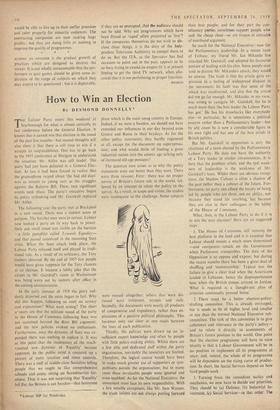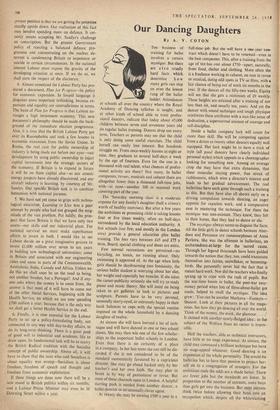How to Win an Election
By DESMOND DONNELLY* rTIFIE Labour Party meets this weekend ' at 1 Scarborough for what is almost certainly its last conference before the General Election. It knows that it cannot win that election in the mood of the past few months—but second thoughts will also show it that there is still time to win if it accepts its responsibilities. One has to go back to the 1955 conference at Margate to understand the situation. Mr. Attlee was still leader. The party had just been defeated in a General _Elec- tion. At last it had been forced to realise that . the gramophone record about the bad old days' was as remote to young ears as the struggles against the Reform Bill. Then, two significant events took place. The party's executive began its policy rethinking and Mr. Gaitskell replaced Mr. Attlee.
The following year the party met at Blackpool in a new mood. There was a sudden sense of purpose. The hatchet men were in retreat..LaboUr now looked a party on its way back to power. Only one small cloud was visible on the horizon —a little pamphlet called Towards Equality- -and that pUssed unnoticed in the mounting Suez crisis. When the Suez attack took place, the Labour Party refound itself and played its tradi- tional role. As a result of its militancy, The Tory timbers shivered. By the end of 1957 few people would have given tuppence for the Tory chances at an eleOtion. It became a lobby joke that the carpet to Mr. Gaitskell's room at Westminster was being worn out by seekers after office in the coming ad ni n istra tion.
In the early summer of 1958 the glory sud- denly departed and the mists began to furl. Why did this happen, following so soon on ecstasy and expectation? What went wrong? The short a-swers are that the militant mood of the party in the House of Commons following Suez was not sustained beyond the Rent Bill argument; and the new policies evoked no enthusiasm. Furthermore, once the dynamic of Suez was ex- pended there was nothing to replace it. It was at this point that the inadequacy of the much- vaunted new dynamic of 'Equality' became apparent. In the public mind it conjured up a picture of more taxation and more controls. There was a sniff of middle-class Socialists telling people that we ought to like comprehensive schools and enjoy, sitting on Scandinavian fur- niture. Thus it was not surprising that 'Equality' fell flat, for Britain is not Sweden—that boresome • Labour MP for Pembroke. place which is the most smug country in Europe. Indeed, if we were a Sweden, we should not have extended our influences in our day beyond even Greece and Rome in their heydays. As for the other policy statements, they hardly registered at all, except for the document on. superannua- tion; and whb would think of leading a great industrial nation into the atomic age talking only of increased old-age pensions?
The question now arises as to why the policy statements were not better than they were. There .were three reason. First: there was no proper survey of Britain's future role in the world, fol- lowed by an attempt to relate the policy to the survey. As a result, in scope and vision, the studies were inadequate to the challenge. Some. subjects were missed altogether; Others that were dis- cussed were irrelevant, myopic and stale. Secondly, the documents were nearly all products of compromise and expediency, rather than ex- pressions of a positive political philosophy. This becomes only too clear as one reads between the lines of each publication.
Thirdly, the policies were drawn up on in- sufficient expert knowledge and often by people with little policy-making ability. Whilst there are a few able and dedicated stall within the party organisation, inevitably the resources are limited. Therefore, the logical course would, have been to make much greater use of supporters or sym- pathisers outside the organisation; but in many cases these invaluable people were ignored and even snubbed. As for the National Executive, the movement must face its own responsibility. With a few notable exceptions, like Mr. Sam Watson, the trade unions are not always putting forward their best people; and for their part the con- stituency parties sometimes support people who seek the cheap cheer—or are frozen in attitudes of moribund argument.
So much for the National Executive—now for I the Parliamentary leadership. In a recent issue of Tribune, my friend Mr. Ian Mikardo has attacked Mr. Gaitskell, and adopted his favourite posture of leading with his chin. Some people may tend to dismiss Mr. Mikardo's attack; they would be unwise. The truth is that his article gave ex- pression to a feeling of widespread disquiet in the movement. Its fault was that some of the attack was misdirected, and also that the article did not go far enough. Mr. Mikardo, in my view, was wrong to castigate Mr. Gaitskell, for he is much more than 'the best leader the Labour Party has got.' He has his drawbacks like everybody else—in particular, he is sometimes a political essayist rather than a Parliamentary leader—but by al-1y count he is now a considerable figure in his own right and has one of the best minds in British politics.
But Mr. Gaitskell in opposition is only the chairman of a team elected by the Parliamentary Labour Party. He does not have the authority of a Tory leader in similar circumstances. It is here that the problem arises, and the real weak- ness of leadership is the weakness of Mr. Gaitskell's team. Whilst there are obvious excep- tions, the Shadow Cabinet is often a shadow of the past rather than a cabinet of the future. Fur- thermore, no party can afford the luxury of being led by people who are there, not on ability, nor because they stand for anything, but because they are nice to their colleagues in the lobby of the House of Commons.
What, then, is the Labour Party to do if it is to win the next election? Here are six suggested steps: 1. The House of Commons still remains the best platform in the land and it is essential that Labour should mount a much more determined —and competent—attack on the Government when Parliament reassembles. The duty of the Opposition is to oppose and expose; but during the recent months there has been a great deal of shuffling and 'statesmanship.' Typical was the failure to give a clear lead when the Americans landed in Lebanon, hence the disproportionate heat when the British troops arrived in Jordan. What is required is a thought-out plan of criticism continually pressed home.
2. There must be a better election-policy- drafting committee. This is already envisaged, but it needs to be of higher level and smaller in size than the normal National EXecutive sub- committee. The task of this committee is to give coherence and relevance to the party's policy— and to relate it directly to assessments of Britain's future position in the world. One point that the election programme will have to state bluntly is that a Labour Government will be in no position to implement all its programme at once; and, indeed, the whole of its programme will be dependent on the rising curve of produc- , lion. In short, the Social Services depend on how hard people work.
3. Turning from the immediate tactics and mechanics, we now have to decide our priorities. They should be (a) Defence, (b) Industrial In- vestment, (c) Social Services—in that order. The present position is that we are getting the priorities exactly upside down. Our realisation of this fact may involve spending more on defence. It cer- tainly means accepting Mr. Sandys's challenge on ,conscription. But the present Government policy of rejecting a balanced defence pro- gramme and concentrating on the nuclear de- terrent is condemning Britain to impotence or suicide in certain circumstances. In the national interest Labour must expose the gravity of the developing situation at once. If we do so, we shall earn the respect of the electorate.
4. Almost unnoticed the Labour Party has pro- duced a document, Plan for Progress—its policy for economic expansion. In limpid language it disguises some important rethinking, because ex- pansion and equality are contradictions in terms. The basis of Plan for Progress is that Labour en- visages a high investment economy. This new document's philosophy should be made the back- ground of the immediate election programme. Also, it is time that the British Labour Party got over its Russophobia and took a few lessons in economic expansion from the Soviet Union. In Russia, the real case for public ownership of industry is being made out before our eyes—vast development by using public ownership to inject capital investment into the strategic sectors of the economy. If Britain is to expand in future it will be on State capital also—as our atomic energy projects have already discovered, and our aircraft industry is learning, by courtesy of Mr. Sandys. Our specific British task is to combine humanism with national purpose.
5. We have not yet come to grips with techno- logical education: Learning to Live was a poor attempt by people who had not grasped the mag- nitude of the vast problem. Put baldly, the pros- pect that faces Britain is that we have only two assets—our skills and our industrial plant. For national survival we must make, superhuman efforts to invest in both. I would like to see Labour decide on a great imaginative gesture to invest £1,000 million over seven to ten years in building new technological universities; some in Britain and associated with our engineering cities and some in parts of the Commonwealth, Australasia, India, Canada and Africa. Unless we do this we shall soon be on the road to being, not another Sweden, but a Portugal I And if any- one asks where the money is to come from, the answer is that most of it will have to come out of the other Social Services, beginning with the Health Service, on which we are now spending £700 million a year; because that is the only way we shall get a better Health Service in the end.
C. Finally, it is now essential for the Labour Party to set up a policy-formulating body, not connected in any way with day-to-day affairs, to do its long-term thinking. There is a great pool of good will in industrial and academic life to draw upon. Its fundamental task will be to marry the British Radical tradition with the Socialist concept of public ownership. Above all, it will have to show that the man who said Socialism is about equality was wrong—Socialism is about freedom, freedom of speech and thought and freedom from economic exploitation.
If these things are done now there will be a new mood in British politics within six months; and a Labour Prime Minister may even be in Downing Street within a year.



































 Previous page
Previous page